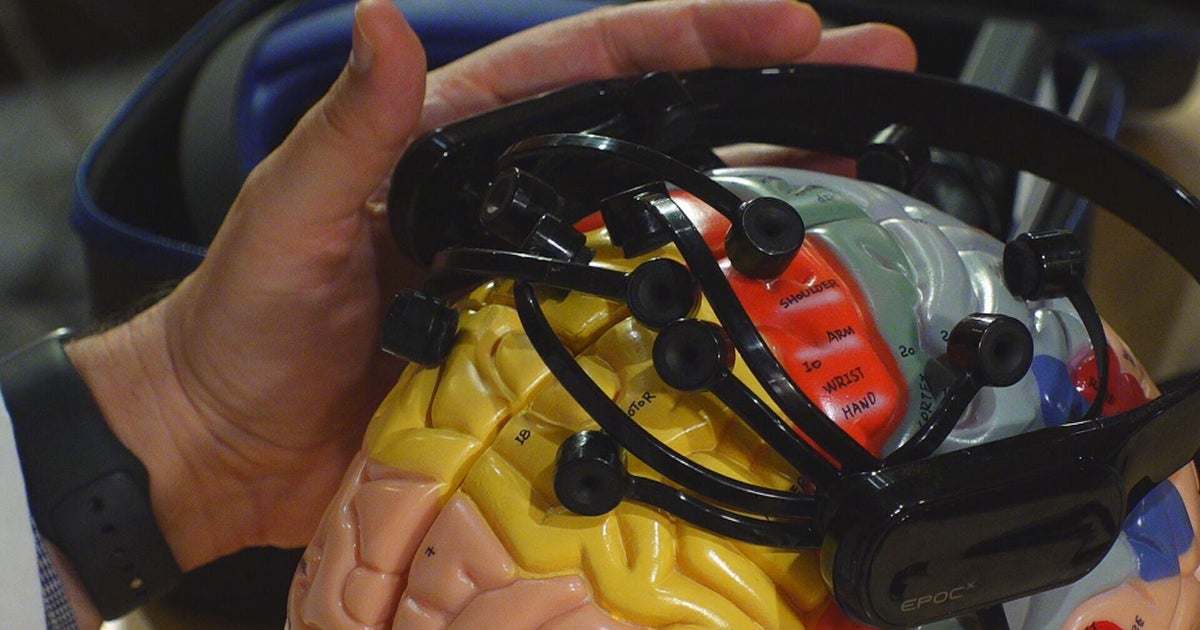Alzheimer's Drug Fails Study But Flashes Potential
INDIANAPOLIS (AP) — An Alzheimer's treatment from Eli Lilly and Co. failed to slow memory decline in two separate patient studies, but the drug did show some potential to help in mild cases of the mind-robbing condition that is notoriously difficult to treat.
The Indianapolis drugmaker's announcement could be a step toward a long-awaited breakthrough in the fight against the disease. But researchers not tied to the studies — and Eli Lilly itself — cautioned against overreacting to the initial results.
Lilly said Friday that its treatment, solanezumab, failed to slow the rate of cognitive decline, which involves a person's ability to remember things, in two late-stage studies of about 1,000 patients each. But when data from the trials were combined, scientists saw a statistically significant slowing of that rate in the bigger population.
They also saw a statistically significant result when they examined a subgroup of patients with mild cases of Alzheimer's disease. The studies focused on patients with mild to moderate Alzheimer's cases.
Lilly officials would not discuss details of the results and said that they plan to talk with regulators about the next steps for the drug, which has yet to receive Food and Drug Administration approval. Full results from the studies will be presented at two scientific conferences in October. It's unclear how the FDA will view the results, given that the drug missed its main goals.
William H Thies, chief medical and scientific officer for the Alzheimer's Association, which was not involved in Lilly's research, said the statistical significance of the combined results is important.
"If that can be replicated, that is a major finding," he said. "It's the first time we've been able to change the course of Alzheimer's disease or any part of Alzheimer's disease in people."
But because the drug missed its main goals, Thies said the drug "isn't going to the (FDA) tomorrow to be approved for sale."
If you look through "rose-colored glasses" at the results, there may be a sign of potential benefit on cognitive tests, said Dr. Ronald Petersen, director of the Mayo Clinic's Alzheimer's Disease Research Center. But it is not clear whether that is enough to make a real difference clinically in how patients do, he said.
The key will be details the company will present later on brain imaging and other tests, he said.
"The danger would be an over-interpretation of a small finding or a subtle effect," said Petersen, who heads a safety monitoring panel for two companies working on a different Alzheimer's treatment.
About 35 million people worldwide have dementia, a term for brain disorders that affect memory, judgment and other mental functions. Alzheimer's is the most common type. In the United States, more than 5 million people have Alzheimer's, which is the country's sixth-leading cause of death.
Many Alzheimer's patients typically live four to eight years after diagnosis, as the disease gradually erodes their memory and ability to think or perform simple tasks. Current Alzheimer's treatments only temporarily ease symptoms such as memory loss, confusion and agitation. They don't slow, stop or reverse mental decline.
Drugmakers have tried and failed for years to develop successful treatments for the disease, and patients and doctors are anxious for something that can slow the disease's progression. Analysts have said such a treatment, if approved, could be worth billions of dollars in sales.
Earlier this month, Pfizer Inc. and Johnson & Johnson said they would end development of an intravenous version of their potential Alzheimer's treatment, bapineuzumab, after two late-stage studies showed it worked no better than a placebo in patients with mild-to-moderate cases. The companies are still studying an injectable version of the drug.
Lilly's announcement Friday comes two years after the drugmaker stopped developing another potential treatment, semagacestat, after patients taking the drug wound up faring worse than those on a placebo.
Scientists say the search for a better Alzheimer's treatment presents several problems. To start, the brain is the most complex organ in the body and the one that researchers know the least about.
Biological triggers behind disease development remain largely unproven, although certain factors like age increase the risk of getting it. Scientists believe changes in the brain of a person with Alzheimer's begin several years before the patient shows symptoms of the disease. That means that by the time diagnosis happens, the brain may be essentially too damaged for potential treatments to work.
Doctors diagnosed John Baker, 71, of Watertown, S.D., with early-stage Alzheimer's disease in 2010. The former mechanical engineer said his family has watched him become forgetful, tell the same stories over and over and misplace things. He said he has no expectation that scientists will make a breakthrough soon enough to help him.
"Realistically, I'm not going to wait and worry and read every line on every report," he said.
Still, he's taking Aricept, a treatment for the disease made by Pfizer and Japanese company Esai Co. Ltd, to try to control the symptoms. He's also participating in a brain scan study to help doctors find a cure for future generations.
Lilly officials cautioned Friday that their study did not show that solanezumab slowed the progression of Alzheimer's. Even so, they were encouraged.
Solanezumab binds to beta-amyloid protein, which scientists believe is a key component to sticky plaque that basically gums up the brain of a patient with Alzheimer's disease. The drug is designed to bind to the protein and help the body remove it from the brain before it can form that plaque. Lilly said that while the individual trials missed their main goals, the combined results showed there may be some validity to this approach.
"We really think this idea of attacking amyloid plaques is a valid hypothesis, that's important news," said Dave Ricks, president of Lilly Bio-Medicines.
But Dr. Sam Gandy, head of Alzheimer's disease research at Mount Sinai School of Medicine in New York, said Lilly's statement on the results "is very tentative."
"I believe in the notion that an amyloid-lowering agent like solanezumab will eventually work in early disease or pre-symptomatically, but whether these data provide compelling evidence that solanezumab has 'cleared the bar' just cannot be concluded" until full results are presented, Gandy wrote in an email.
Dr. Tim Anderson, an analyst who covers Lilly for Bernstein Research, said in a research note the solanezumab results would be viewed positively because expectations for the drug were low.
Lilly is counting on drugs in its development pipeline to help replace revenue it is losing due to patent expirations for key products. The company lost U.S. patent protection for its all-time best-selling drug, the antipsychotic Zyprexa, last year, and it will lose protection for its current top-seller, the antidepressant Cymbalta, next year. Those drugs totaled $8.78 billion in revenue last year, or 36 percent of the company's total.
Lilly shares climbed 3.4 percent, or $1.46, to $43.86 Friday, outpacing broader trading indexes that rose less than 1 percent.
(© Copyright 2012 The Associated Press. All Rights Reserved. This material may not be published, broadcast, rewritten or redistributed.)







